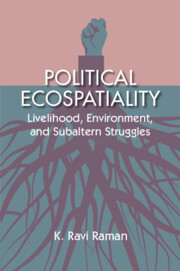Book contents
- Frontmatter
- Contents
- Acknowledgements
- 1 What Is Politics Proper? Why Political Ecospatiality Matters?
- 2 Birlas in Communist Kerala: Clash and Consensus as Subaltern Narratives
- 3 Occupy Muthanga: Land, Forest, and Reinventing Indigeneity and Identity
- 4 Dalits and the Global Cola: Water, Power, and Resistance
- 5 Politics, Epistemology, and Environmental Modernity: Anti-endosulfan as Ethical Practice?
- 6 Caste, Land, and the State: What If Chengara Took the Place of Muthanga?
- 7 Pombilai Orumai: Plantation Dalits, Intersectionality, and Power
- 8 Ecospatiality: Right-Making/State-Making
- Index
7 - Pombilai Orumai: Plantation Dalits, Intersectionality, and Power
Published online by Cambridge University Press: 31 August 2024
- Frontmatter
- Contents
- Acknowledgements
- 1 What Is Politics Proper? Why Political Ecospatiality Matters?
- 2 Birlas in Communist Kerala: Clash and Consensus as Subaltern Narratives
- 3 Occupy Muthanga: Land, Forest, and Reinventing Indigeneity and Identity
- 4 Dalits and the Global Cola: Water, Power, and Resistance
- 5 Politics, Epistemology, and Environmental Modernity: Anti-endosulfan as Ethical Practice?
- 6 Caste, Land, and the State: What If Chengara Took the Place of Muthanga?
- 7 Pombilai Orumai: Plantation Dalits, Intersectionality, and Power
- 8 Ecospatiality: Right-Making/State-Making
- Index
Summary
Kuppathotti nankalku
Kottum suitum ungalku
Katikanni nankalku
Chickendosa ungalku
Pottalayangal nangalku
AC banglaow ungalku
Kolunthu nullathu nankai
Kasatikathu ninke
We are clothed in rags and
You are in suits
For us, plain gruel
You feast on meat
We are shack dwellers.
You live in AC bungalows
We pluck the leaves
You pocket the money
—Slogans raised in the Munnar agitationAlain Badiou points out that subjects become political when they create events – events as trans beings (see Hallward 2003; Badiou 2005, 2009) – even without the mediation of an agency. Badiou (see Hallward 2004) would also constantly remind us that what is important is post-eventual declaration: to quote Lisy Sunny, one of the Dalit woman leaders of Pombilai Orumai in Munnar, ‘[A]t least now we have a union of our own.’
The protests that rocked the Kanan Devan tea plantations, formerly Scottish James Finlay, in Kerala in 2015, led by the historic Pombilai Orumai – the women's unity – and later a parallel state-wide struggle spearheaded by the mainstream trade unions had been called off following what could best be described as mixed outcomes. While the plantation management has had to shift its position with regard to its decision not to increase the bonus or wages, the workers had to content themselves with a 30 per cent hike in wages as against their original demand for a 100 per cent increase. Yet the struggle has been path-breaking as it helped bring to light the harsh living and working conditions on the colonially evolved plantations. The company's claim that it ‘ranked No. 1 in the category [of] best company for employees’ involvement and participation in India’ and ‘featured among the 100 best companies to work [as per] its employees in India’ was exposed as an untruth. In fact, the observations made at the second All Kerala Thozhilali Sammelanam (All Kerala Workers’ Meet) held at Trichur in 1937 under the leadership of veteran communists including P. Krishna Pillai, N.C. Sekhar, R. Sugathan, and A.K. Gopalan, that of all the workers it was the plantation workers who suffered the most (see Raman 2010), remains true to this day – after nearly seven decades of Indian independence – with hardly a change in the historically evolved plantation-based patriarchal forms of exploitation/oppression.
- Type
- Chapter
- Information
- Political EcospatialityLivelihood, Environment, and Subaltern Struggles in Kerala, pp. 176 - 197Publisher: Cambridge University PressPrint publication year: 2025

